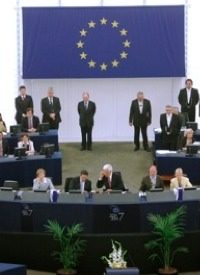
Buzek, generally described as a "center-right" candidate, received 555 votes to 89 received by far-left Swedish MEP Eva-Britt Svensson. According to a previously agreed-upon arrangement, Buzek will take the post for the first two-and-a-half years of the five-year term, followed by Socialist leader Martin Schulz for the second two-and-a-half years.
"I see my election as a sign to these countries. I also regard it as a tribute to millions of citizens of our countries who did not bow to a hostile system," Buzek told the 736-member European body, which meets in Strasbourg, France. "There is no you and us. This is now our shared Europe."
"Once upon a time," Buzek told the Parliament, "I hoped to be a part of the Polish Parliament in a free Poland. Today I have become the president of the European Parliament — something I could never have dreamed of."
Reuters reported that European Commission President Jose Manuel Barroso praised Buzek’s election as a sign that European integration had been a success since eight countries from eastern and central Europe joined the EU in 2004, followed by two more in 2007. "Twenty years after the Berlin Wall came down, five years after enlargement, your election today is, I think, a resounding victory for a united Europe," Barroso told the continent-wide parliament.
Just prior to the vote, Buzek called for all EU member states to approve the Lisbon treaty, which would increase parliament’s powers by extending co-decision to virtually all areas of EU policy. Ireland, whose voters previously rejected the treaty, will hold another referendum on it on October 2. To become effective, the treaty must be approved by all EU member nations.
"We can only manage well if we adopt and sign the Treaty of Lisbon. This will help us," said Buzek. "It will help us to work better in the international arena, where we have obligations."
The New York Times reported that Buzek’s primary responsibility as president will be to serve as chairman of parliamentary sessions. The position also entails representing the Parliament at summit meetings of European Union leaders and international events. The president has a cabinet, which includes 39 members, including support staff and advisers.
Buzek was a member of the Solidarity trade union federation, which is widely credited with ending communist rule in Poland in 1989. But the conventional view of Solidarity has been challenged by defectors from the Soviet bloc, most notably Anatoliy Golitsyn — a Soviet KGB defector.
In his 1984 book, New Lies for Old, Golitsyn charged that Solidarity was partially suppressed by Polish communist authorities in 1981 as a ruse to convince the West that the trade union was an authentic opponent of the hard-line regime headed by Prime Minister Wojciech Jaruzelski. Golitsyn predicted that eventually "it may be expected that a coalition government will be formed, comprising representatives of the communist, of a revived Solidarity movement, and of the church. A few so-called liberals might also be included." Just as Golitsyn predicted, a coalition government was formed in Poland, and it did include many communists in it, as well as members of the now-legalized Solidarity movement and the so-called liberals that Golitsyn described.
In an interview with Solidarity’s most prominent spokesman and leader, Lech Walesa, in the March 2, 1989 issue of the Soviet current affairs weekly New Times, Walesa acknowledged that he was not seeking to take power away from the communists. "Let power remain in the hands of the Communists," he said, "but let it be different. Let it serve the people better, respect the law and be accountable to society. We are prepared to cooperate constructively with such authorities."
The stark predictions made by Golitsyn — predictions that Europeans intent on forming a continent-wide government can ignore only at their peril — include:
• "If ‘liberalization’ is successful and accepted by the West as genuine, it may well be followed by the apparent withdrawal of one or more communist countries from the Warsaw Pact to serve as the model of a ‘neutral’ socialist state for the whole of Europe to follow."
• "If [liberalization] should be extended to East Germany, demolition of the Berlin Wall might even be contemplated." [Notice that in hailing Buzek’s election, European Commission President Jose Manuel Barroso referred to the coming down of the Berlin Wall, which though a great symbolic victory for freedom, was to Golitsyn part of a well-orchestrated charade.]
• "The European Parliament might become an all-European socialist parliament with representation from the Soviet Union and Eastern Europe. ‘Europe from the Atlantic to the Urals’ would turn out to be a neutral, socialist Europe."
While the ascent of Jerzy Buzek to the largely ceremonial post of president of the European Parliament may be a source of pride for Poles, his former association with Solidarity should not necessariliy be taken as an indication that the EU has suddenly turned anti-socialist or "conservative."
At this point the only hopeful sign on the horizon for anti-socialist Europeans is that Irish voters may disregard Buzek’s advice and once more reject the Lisbon treaty at the polls this October.
Photo of plenary room of the EU Parliament: AP Images



